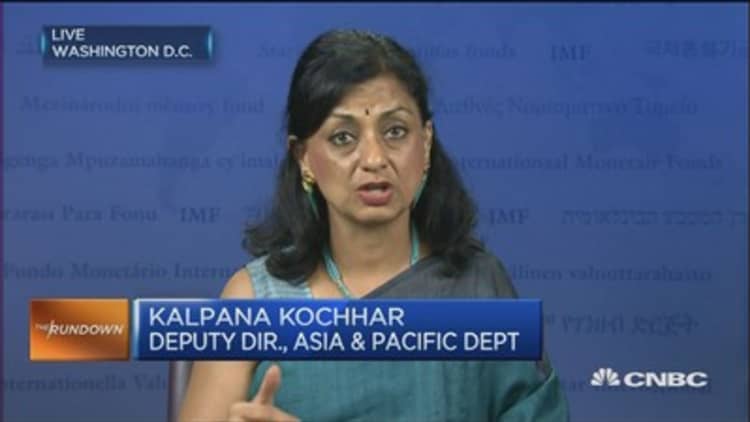
Japan needs to reduce its reliance on a weak yen to reflate its economy, the International Monetary Fund (IMF) warned, as it called on authorities to speed up "high impact" structural reforms and prepare for further monetary easing.
"The Bank of Japan needs to stand ready to ease further, provide stronger guidance to markets through enhanced communication, and put greater emphasis on achieving the 2 percent inflation target in a stable manner," the IMF said in its 2015 Article IV Consultation with Japan published late Wednesday.
Under current policies, the central bank won't meet its 2 percent inflation target in the medium-term, or over a five-year horizon, according to the international lender.
After rising to 1.5 percent in mid-2014, core inflation - excluding fresh food and the effects of the consumption tax increase - has declined rapidly and has been close to zero since February 2015.
"Abenomics needs to be reloaded so that policy shortcomings do not become a drag on growth and inflation," the IMF said. Abenomics refers to three-pronged economic revival plan launched by Prime Minister Shinzo Abe in late 2012, consisting of monetary easing, fiscal expansion and structural reforms.
Deeper structural reforms must accompany further easing if the government is to achieve its inflation goal, the IMF stressed.
"With the exception of corporate governance and some progress on female labor force participation, structural reforms have not yet been in areas that could provide the biggest bang for the buck," it said.
Read MoreJapaneseinvestors give thumbs-up to Abenomics
Speaking to CNBC, Kalpana Kochhar, deputy director of the IMF's Asia and Pacific department, said more vigorous efforts are needed to raise labor supply and open up domestic markets.
"On the labor front, we think there's scope to increase the use of foreign labor. There's also a need to use more flexible labor contracts so you can bring people into the labor force," Kochhar said.
"Most importantly, for productivity growth, we think that Japan needs to do more to deregulate its agriculture and services sectors, possibly in the context of the upcoming TPP agreement," she said, referring to the 12-nation Trans-Pacific Partnership - a free-trade pact covering 40 percent of the global economy.
Japan's economy has been on a rollercoaster ride over the past year. After taking a major hit from a sales-tax increase in April 2014, the world's third largest economy appears to be staging a comeback this year.
Gross domestic product (GDP) growth was revised sharply higher in the first quarter to an annualized 3.9 percent, up from a preliminary reading of a 2.4 percent increase, following a 1.5 percent rise in the October-December period.
Read MoreJapan's first-quarter GDP revised sharply higher
"The rebound in business investment is especially encouraging, but consumption remains sluggish and more than half of the reported quarterly growth stemmed from inventories," the IMF said. "Leading indicators such as retail sales and industrial production suggest a continued modest recovery of domestic demand in the second quarter of 2015."
The IMF, however, warns that risks to growth are titled to the downside.
"The economic recovery could stall on weakness in domestic demand. Wage growth following the spring Shunto (annual synchronized wage bargaining) round and spending of the oil windfall could disappoint. Smaller wage growth would imply larger multipliers from the fiscal adjustment in the pipeline, resulting in more depressed demand," it said.


